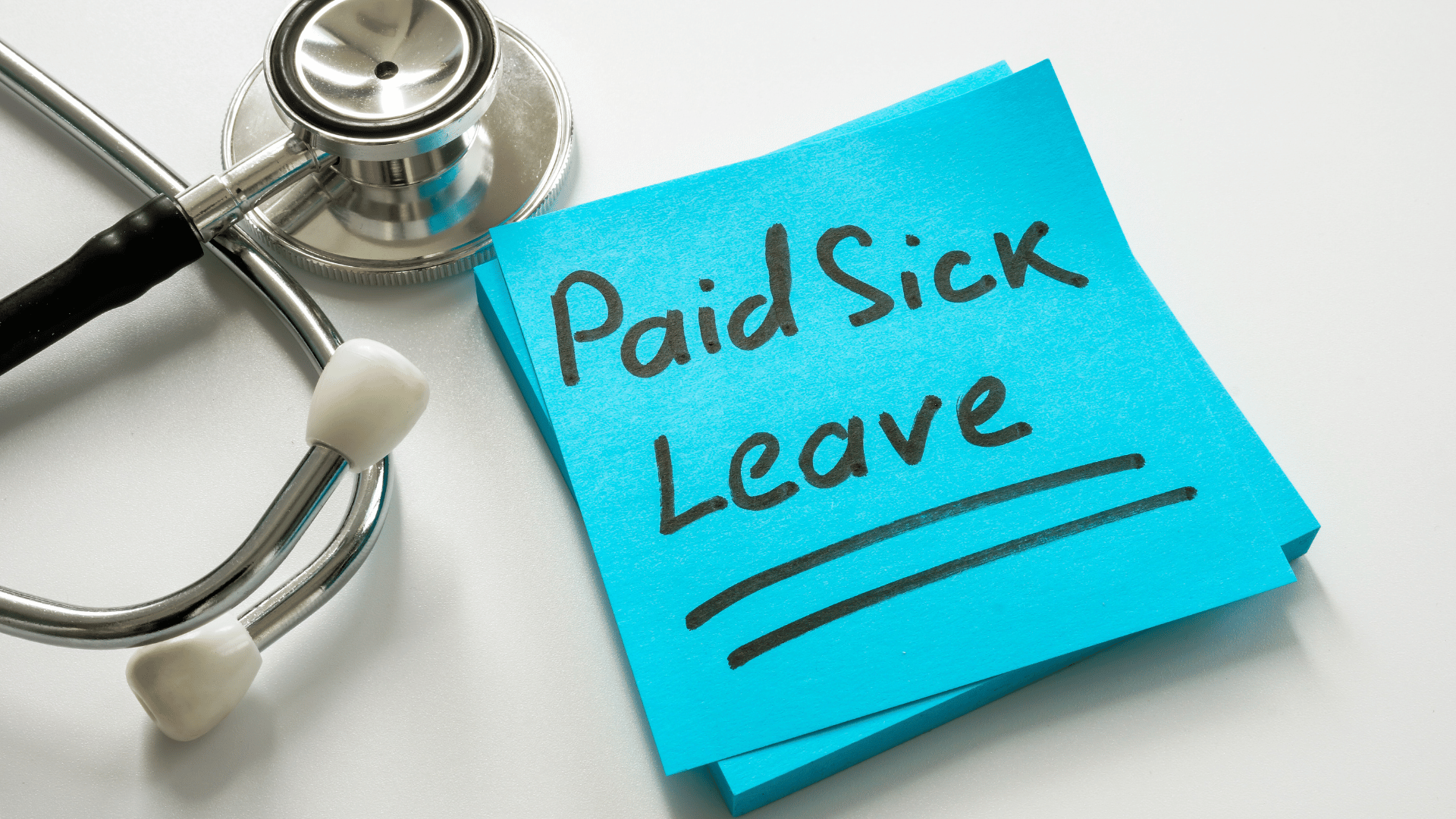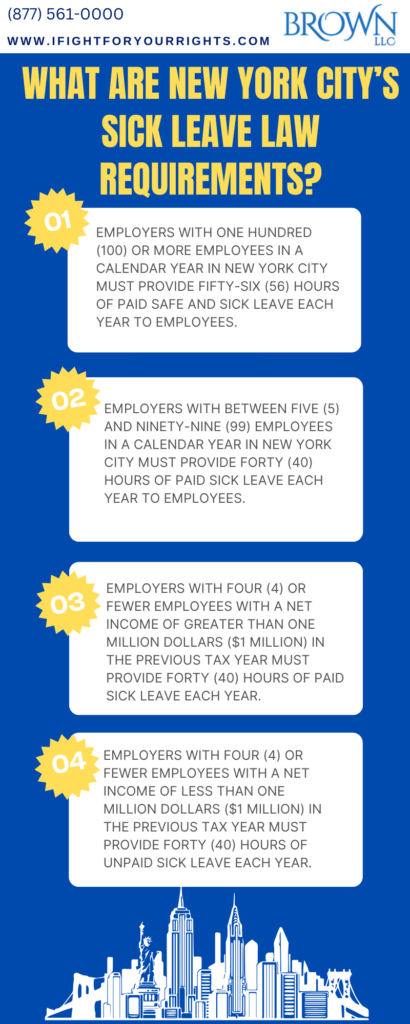New York City Companies: Be Prepared for a Change to Sick Leave Laws

Companies in New York City should prepare for an increase in potential liability under New York City’s updated sick leave laws. In January 2024, New York City passed legislation which amends the Earned Safe and Sick Time Act, which is the law that governs New York City’s sick leave policies. Starting on March 20, 2024, employees who have a dispute with the amount of sick leave they are provided by their employer will be able to initiate lawsuits as private individuals in court. Previously, disgruntled employees were required to bring these claims through New York City’s Department of Consumer and Worker Protection. These enhanced rights for employees can potentially increase the amount of liability that an employer could face if it is not in compliance with New York’s sick leave laws. A qualified employment labor attorney will help to ensure that employers are in adherence with these laws and walk them through all the avenues of potential liability to minimize the number of potential lawsuits.
What Are New York City’s Sick Leave Law Requirements?
New York City’s sick leave laws are governed by the Earned Safe and Sick Time Act, also known as the Paid Safe and Sick Leave Law. The requirements according to the New York City Department of Consumer and Worker Protection, are as follows:
- Employers with one hundred (100) or more employees in a calendar year in New York City must provide fifty-six (56) hours of paid safe and sick leave each year to employees.
- Employers with between five (5) and ninety-nine (99) employees in a calendar year in New York City must provide forty (40) hours of paid sick leave each year to employees.
- Employers with four (4) or fewer employees with a net income of greater than one million dollars ($1 million) in the previous tax year must provide forty (40) hours of paid sick leave each year.
- Employers with four (4) or fewer employees with a net income of less than one million dollars ($1 million) in the previous tax year must provide forty (40) hours of unpaid sick leave each year.
Additionally, employers must give new employees the Notice of Employee Rights when they begin employment, or when their rights change. This notice must be provided in English, and also in the employee’s primary language if available on the Department of Consumer and Worker Protection website. Employers must also post the notice in an area visible and accessible to employees in the workplace.
Speak with the Lawyers at Brown, LLC Today!
Over 100 million in judgments and settlements trials in state and federal courts. We fight for maximum damage and results.
Examples of Sick Leave Law Violations in New York City
Violations of the New York City Paid Safe and Sick Leave Law have been significant enough to prompt legal actions against major corporations. For instance, in December 2019, New York State Attorney General Letitia James, Mayor Bill De Blasio, and the Department of Consumer and Worker Protection announced a settlement with Starbucks over violations of this law. The settlement was the result of a lengthy joint investigation, which revealed that Starbucks had implemented an illegal sick leave policy. The policy required employees to find substitutes when taking sick leave, failing which they could face disciplinary actions, including termination. This case highlighted not only the specific infractions by Starbucks, but also served as a public admonition to all employers in New York City about the serious enforcement of workers’ rights laws. As part of the settlement, Starbucks agreed to create a $150,000 restitution fund for affected employees and take steps to ensure compliance with the law.
How the Amended Earned Safe and Sick Time Act Affects Employers and Employees
The amendment to the New York City Earned Safe and Sick Time Act, effective March 20, 2024, significantly alters the enforcement of sick leave policies by allowing employees to take direct legal action against employers. This amendment gives employees the power to sue for a variety of financial remedies including: i) the greater of $250 or three times their unpaid wages per incident of sick leave denial, ii) a $500 penalty for each instance of unlawful denial, and iii) compensation for lost wages and benefits ranging from $500 to $2,500. Additionally, successful claimants can recover attorney’s fees, both incentivizing legal action and potentially increasing employer liabilities.
Previously enforced by the Department of Consumer and Worker Protection, by the issuing of penalties, the new private right of action introduced by the amendment raises the stakes for compliance. Employers now face not only administrative fines, but also the prospect of litigation and its associated costs. Now, with the private right of action in effect, employers must be more diligent than ever to ensure compliance with the law to avoid the risk of costly litigation. The law emphasizes the need for businesses to keep up-to-date policies, thorough record-keeping, and proper training for staff involved in the administration of sick leave.
How an Employment Labor Law Can Assist In Navigating The New Amendment
An employment labor lawyer is an invaluable asset in navigating the complexities of the amended New York City Earned Safe and Sick Time Act. A skilled employment labor lawyer will provide sound guidance to ensure that a business’s policies and procedures are fully compliant with the updated legal requirements. This entails both thorough reviews and updates to existing sick leave policies, as well as the development of new ones if necessary. Employment labor lawyers also play a crucial role in educating and training employers, human resources professionals, and managerial staff on the nuances of the law to handle sick leave requests effectively and lawfully.
Employment labor lawyers are pivotal in minimizing the risk of litigation by ensuring that an employer’s practices adhere strictly to the legal standards set forth by the amendment. In the event of a dispute or a lawsuit, these lawyers offer their skilled experience to defend employers in court. They provide representation during legal proceedings, aiming to protect the interests of the business by mitigating potential liabilities. By proactively engaging with an employment lawyer, employers can safeguard their operations against the increased liabilities brought about by the updated New York City sick leave laws and maintain a fair and legally compliant workplace.

